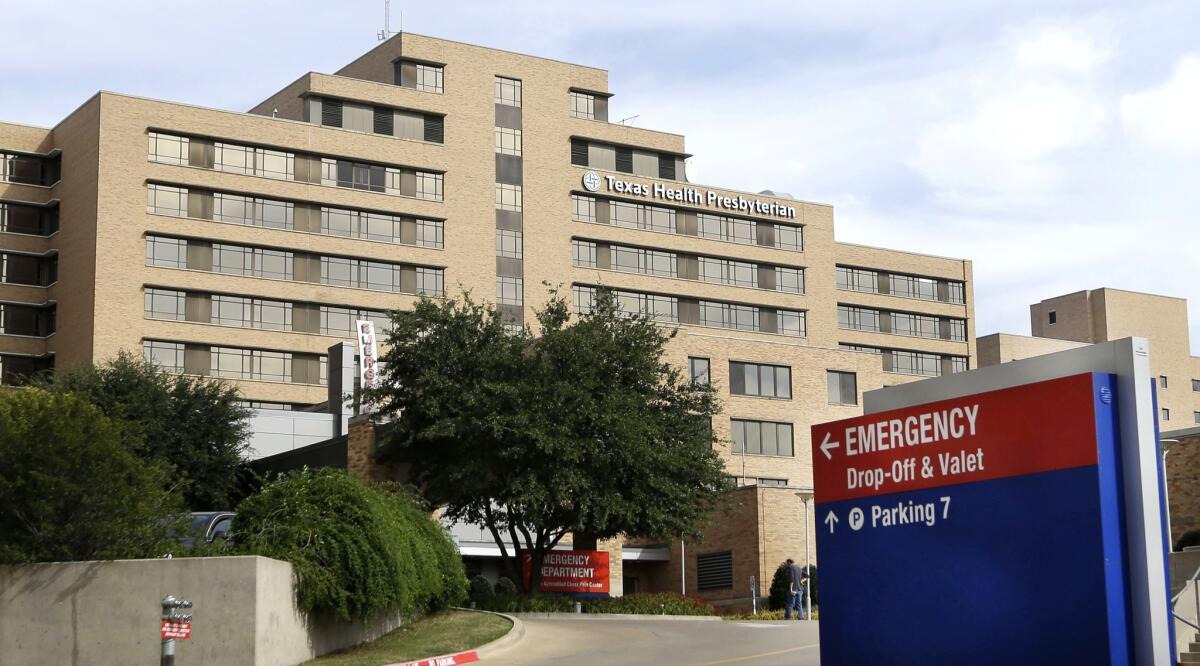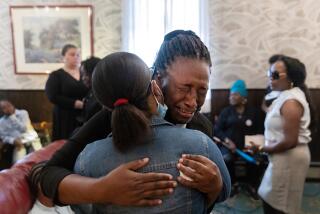Family, friends question medical care given Texas Ebola patient

Texas Health Presbyterian Hospital in Dallas, where Ebola patient Thomas Eric Duncan was treated.
- Share via
Reporting from Dallas — Family and friends of the first person to die of Ebola in the United States condemned the medical care that Thomas Eric Duncan received and called for a full examination of the case.
Duncan, 42, who was from Liberia, died Wednesday in Dallas after being infected with Ebola in Africa. He had been in isolation, being treated with an experimental drug, since Sept. 28.
Hours after Duncan’s death was announced, his fiancee, Louise Troh, called for an examination of how Duncan was treated.
“I trust a thorough examination will take place regarding all aspects of his care,” she said in a statement.
Duncan, who had left Liberia Sept. 19, was treated at Texas Health Presbyterian Hospital with the experimental antiviral drug brincidofovir.
However, he did not receive any transfusion of blood from an Ebola patient who had recovered. That treatment is considered experimental and was used on another American who has since recovered.
There also are questions about how Duncan was treated when he first arrived at the hospital Sept. 25, complaining of symptoms and telling personnel that he had traveled from West Africa. The travel information should have been a warning sign, officials have said.
Duncan was released with antibiotics. He was rushed back to the hospital three days later with more severe symptoms.
Troh’s daughter, Youngor Jallah, condemned the hospital’s actions. “The hospital didn’t treat him right,” Jallah said.
“That’s what everybody thinks,” added Aaron Yah, the father of four children with Jallah.
“One, he’s from Africa,” Jallah said of Duncan. “Two, he didn’t have insurance.”
Dallas County Commissioner John Wiley Price, who is black, raised questions over whether Duncan was initially released from a Dallas hospital because of his race and lack of health insurance.
“The real elephant in the room is, the man was black, he had no insurance, and therefore he was basically turned away,” Price told the Los Angeles Times.
When asked how he knew Duncan didn’t have insurance, Price said, “If he had pulled out an insurance card, he wouldn’t have had a problem. I’m willing to stake my life on the fact he didn’t have insurance. He’s from Liberia!”
Price called Texas Health Presbyterian a “boutique” hospital that doesn’t normally serve indigent patients.
Price added: “I make the claim, we know he didn’t have insurance, and he was black. They did what they traditionally do: They gave him some pills and sent him on his way, basically ignoring all the CDC protocols.
“If you’re of color and present without insurance -- they’re not going to call it ‘dumping,’ but in the final analysis, that’s basically what they did,” he said.
A hospital spokesman responded: “Mr. Duncan was treated the way any other patient would have been treated, regardless of nationality or ability to pay for care. We have a long history of treating a multicultural community in this area.”
Yah has insurance, and his children are covered by Medicaid, but Jallah does not have insurance and is worried what might happen if she falls ill.
As of Wednesday, she said she and her children were healthy. But she was holding a cold compress to her head, stressed by Duncan’s death, cooped up in a stuffy apartment that had been without power for days after a Thursday storm.
Jallah lives near her mother and usually takes her children to Texas Health Presbyterian’s emergency room for treatment. Now, she does not trust the hospital, she said.
“It’s my worry ... that I will be treated the same way” as Duncan, Jallah said.
Hennessy-Fiske reported from Dallas, and Pearce and Muskal from Los Angeles.
Follow @latimesmuskal for national news.
More to Read
Sign up for Essential California
The most important California stories and recommendations in your inbox every morning.
You may occasionally receive promotional content from the Los Angeles Times.













